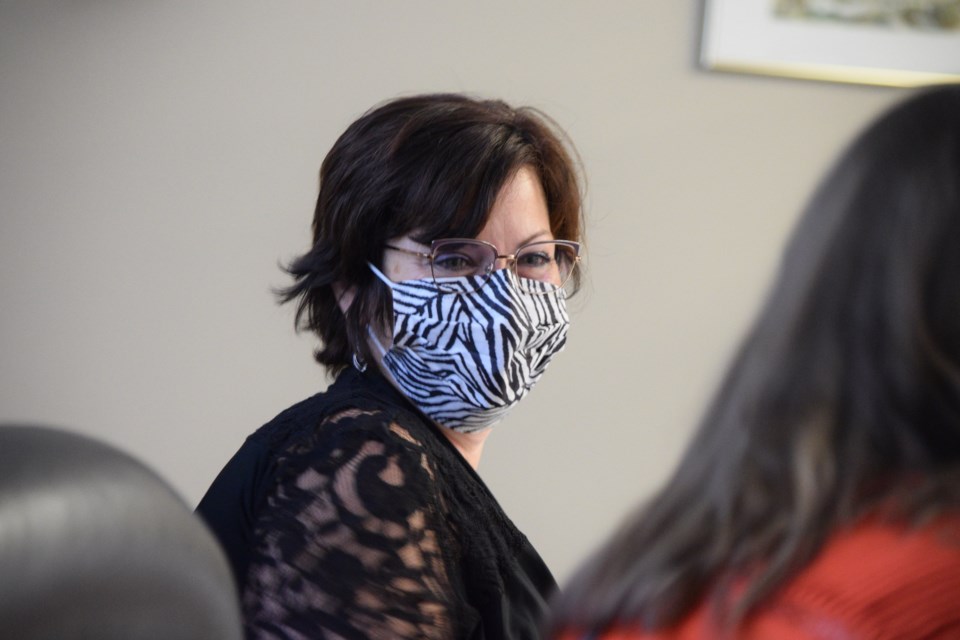BARRHEAD-The Barrhead and District Family Community Support Services (FCSS) Thrive program is on life support.
FCSS executive director Karen Gariepy told the County of Barrhead councillors during their Oct. 15 meeting that if they do not find a new source of funding, the program will cease to exist by the end of the year.
Thrive is FCSS's family violence and relationship abuse prevention initiative. It gets its name because that is what they hope clients will do after accessing its services. The program is part of the FCSS' community programming.
"(Going into the New Year) I am looking at everything in FCSS to ensure that this program continues," Gariepy said. "Healthy relationships make healthy communities, so anything we can do to promote healthy relationships and prevent domestic violence is something that we need to do."
She added that FCSS has applied for a provincial grant with Healthy Families Healthy Futures in Westlock that, if successful, would allow Thrive outreach worker Cheri Jantz to continue her work three days a week.
"For five years, we have been waiting for an answer ... I am starting to panic, so I am cutting back some of our other programs, but they are all critical," Gariepy said, adding that as a result, they might be asking the municipality to contribute more come budget time.
This is not the first time the Thrive program has been in jeopardy. In September 2018, then-FCSS director Shelly Dewsnap announced that the program would end in March after its provincial funding was exhausted.
Since then, the program has continued on the strength of FCSS' community fundraising efforts, buoyed by a $15,000 grant from the Town of Barrhead and a $15,000 donation from the Barrhead Rotary Club. Both donations were part of a partnership proposed by the Rotary Club. They suggested that the Rotary Club and the town and county contribute $15,000, as their combined contributions equalled roughly a year of Thrive's operating budget. County council denied the Rotary Club's request.
Jantz said Thrive's clients generally fall into two categories: "people who are personally experiencing domestic abuse or violence or the family of someone who is the victim of abuse” and they don't know what to do to help."
Currently, Jantz is working with 22 "Thrive" or domestic abuse victim clients and 26 outreach (or extended family of victims) clients.
"Of the Thrive clients, 18 are from the county with 10 county outreach clients," she said.
Jantz then took the opportunity to dispel some of the misconceptions on helping domestic abuse victims, especially in rural Alberta.
She said shelters can be very effective in some circumstances, but in rural Alberta, they are not viable.
"You are not going to pick up your children and leave your job, mom and dad, siblings, cousins. Those are the relationships that are going to serve you when you are at your greatest need," Jantz said, adding the other issue is the lack of anonymity in small communities. "Everyone knows where the shelter is, including the abuser."
Those are the reasons, she said, why Barrhead and Westlock, through Healthy Families Healthy Futures, decided to go with an outreach model.
"We help abuse victims continue to live in the community, keep them and their children safe and move past their exposure of domestic violence," she said.
Jantz said she also works with new parents through the Barrhead Family Resource Network (FRN) to teach parenting skills.
"How do you have healthy relationships so that your children aren't vulnerable to abuse? And how do you stop them from being abusive because bullying is part of childhood," she said. "Learning how to have healthy relationships, focussing on positive skill sets, and how to deal with challenges and delayed gratification."
Jantz also works in the schools working one-on-one with students, often with abusers.
Another large part of Jantz’s job is connecting victims and abusers with the supports they need.
She added that Healthy Families Healthy Futures recently added a support worker who works with senior abuse victims in Athabasca, Barrhead and Westlock.
"Most of the time, as a rule, the type of domestic abuse seniors face tends to be financial. Seniors who have been taken for all their money by a trusted loved one," Jantz said.
Barry Kerton, TownandCountryToday.com



